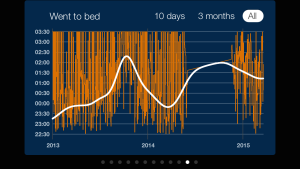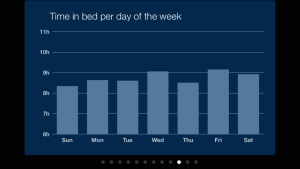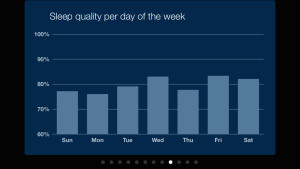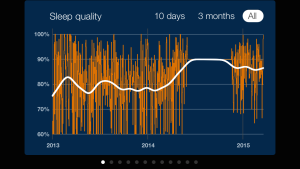Confession: I willingly let something watch me every night while I sleep…which brings us to the next chapter in my Sleep Series! In Part I of this series, I discussed the various sleep stages. In Part II, I analyzed how light and color affect these stages. Now it’s time to look at a way you can actually track these stages! And all you need is your (presumably smart) phone.
SLEEP CYCLE APP
Sleep Cycle is, in my opinion, one of the coolest and intuitive apps out there. Available on the iTunes store for a mere 99c, it currently has 4.5 stars out of 75,025 ratings. I feel like that’s pretty legit. The Sleep Cycle app uses the iPhone motion sensors to monitor your movement throughout the night, in order  to chart your sleep cycles, and do some pretty nifty stuff with that info. At the time of this writing, I have used Sleep Cycle for 641 nights, equating to 33.4 weeks worth of time in bed. Oh hey! My average time in bed is 8.5 hours. Solid!
to chart your sleep cycles, and do some pretty nifty stuff with that info. At the time of this writing, I have used Sleep Cycle for 641 nights, equating to 33.4 weeks worth of time in bed. Oh hey! My average time in bed is 8.5 hours. Solid!
Pleasant Wakening
By knowing what phase of sleep you are currently “in,” sleep cycle can wake you up at the end of a sleep cycle, rather than in the middle. This prevents feelings of grogginess. Basically, you tell the app when you MUST be up by, and it will wake you up sometime (within 30 minutes) before then. Ironically enough, waking up a *smidge* earlier can make you less tired in the morning, if it’s at the end of a cycle. Timing is everything. You wake up easily and beautifully, feeling refreshed and ready to go. It’s kinda awesome. What I find particularly interesting, is you have the opportunity to choose from quite a few soothing wake up sounds. Even though these are quiet and peaceful, and even though I now wear ear plugs while sleeping, I still easily wake up to the soft sounds of Sleep Cycle. (In high school I could literally sleep through blaring alarms.) The “snooze” aspect of Sleep Cycle is also “smart,” and adjusts timing to make sure you wake up by your necessary time.
Track Sleep Factors
Upon waking, the Sleep Cycle app generates a cool chart showing your levels of sleep and stages from the night prior. It notes your total sleep duration, and rates your sleep quality. Sleep Cycle also lets you create customizable factors that you feel may affect your sleep (i.e.: caffeine, alcohol, meal timing, stress, supplements, etc.), so you can track them accordingly. Before going to bed, you check off the ones you did that day, and the app calculates how these factors affect your sleep over time. The factors I personally currently chart are the following (prepare yourself!): drank coffee, drank tea, ate late, worked out, stressful day, drank wine early, drank wine late, melatonin, benadryl, natural calm, coconut oil, ketogenic day, high protein, low protein, high carb, working early next day, not working early next day, 5-htp, valerian, kava kava, skullcap, theanine, MCT, gelatin
The Double Edged Sword?
There is one slight downside to using the Sleep Cycle app. I actually ceased usage of the app for a few months, when I realized the sleep quality percentage rating influenced my perception of energy levels throughout the day. This is a psychological effect shown in studies, to be discussed in part 4 of this series! (I have since restarted using the app). As a side note, after updating a few months ago, I noticed the app began ranking my sleep quality as “better” in general. Instead of getting 70% sleep quality, I was getting a lot more in the 90% range. I’m wondering if the designers programmed the app with a sleep quality bias, realizing it would affect the user’s perception of sleep, thus leaving them more energetic and convinced of the positive influence of Sleep Cycle? Hmm….
P.S. Sleeping with your phone right by your head isn’t ideal. (Oh hey EMFs!). Put it on airplane mode.





